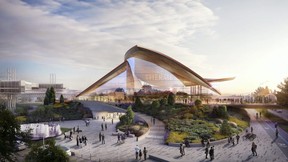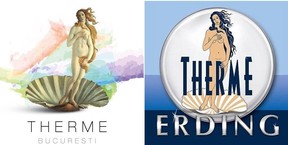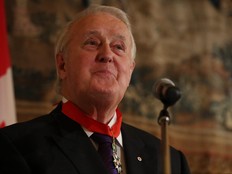Ford seeks answers after firm accused of misrepresentation in Ontario Place bid

Article content
Premier Doug Ford is seeking answers following an explosive report Wednesday that alleged the European company selected to develop the land at Ontario Place into a world-class spa misrepresented itself during the bidding process.
According to the New York Times, Therme Group exaggerated its track record of building and managing luxury spas throughout Europe to secure the deal from the Ontario government.
“When I heard this allegation I went directly to the minister (of infrastructure) and to the deputy and said, ‘Here, look into this,'” Ford told reporters Wednesday.
He added, “they’re going to look into this allegation and find out. Make sure that all the T’s are crossed and I’s are dotted.”

According to the report, the Austria-based firm claimed it was involved in as many as half a dozen spas in Europe when it was one of 34 companies that submitted a bid to redevelop Ontario Place.
However, the report alleged the wellness company had only built and operated just one, near Bucharest, Romania, in 2016.
“Therme Group has proven the success of its concept with six globally placed facilities under operation,” the company said in its 2019 bid.
The paper cited corporate filings in three countries and spoke to a dozen people involved with the company’s operations.
Therme’s finances appeared to be on shaky ground when it bid on the Toronto lakefront property after auditors noticed it was bleeding money and had less than 1 million euros ($1.58 million) in equity.
RECOMMENDED VIDEO
The Ontario Place deal involves a 95-year lease of the artificial island following an unusual process that required bidders to sign nondisclosure agreements.
People involved in the bids revealed that the NDA allowed the province to select the company it wanted whether it met the requirements or if a proposal was even filed. The government also exempted the development from specific environmental reviews and classified it as a real-estate transaction.
Infrastructure Ontario said in a statement to the Times that the bidding process needed to be flexible while still being “infused with some of the best practices from more formal procurements.”
Ford said on Wednesday that Therme’s development of Ontario Place is part of a larger vision for Toronto’s waterfront.
“We have Live Nation, the public realm, we have the marina there, they’re going to have restaurants and events all around the public realm,” Ford said.
“This is going to be something spectacular at the end of the day. It will be the number one tourist attraction, I say, in the country next to … Niagara Falls.”

Ford didn’t confirm whether there would be an investigation into Therme’s bid but did reiterate that the government will “double and triple check” to make sure that “everything passes the smell test.”
Therme Group released a statement in response to the allegations levied by the Times. It called the paper’s reporting “inaccurate and not new news — this has been covered at length and accurately in Canadian media.”
The company said it and the related company A-HEAT “have substantial financial capacity,” citing the province’s auditor general report released last year that said the “2020 audited financial statements show that Therme had met this financial test per the lease requirements.”
In addition, Therme said it “followed all of the rules of the bidding process.”
However, it appears Therme’s claims of building and running spas in Europe gave the Ontario government the belief at the time that the firm had “a proven track record in delivering similar projects,” government staffers evaluating the bid noted.
According to the report, the company’s logo — based on Italian artist Sandro Botticelli’s Venus painting — was similar to another European spa company with the same name at the time.

Therme’s founder, Robert Hanea, told the Times that he was seeking inspiration for land he owned near Bucharest, which was located on top of geothermal springs. He toured spas and water parks in Europe beginning in the mid-2000s and visited the thermal baths of Erding, Germany, close to Munich.
Hanea said he became friends with owner Josef Wund, whose company was called Therme. The German businessman and architect built and owned several spas throughout the country beginning in the 1990s.
Inspired by Wund’s waterpark, Hanea opened his Romanian spa nine years ago and called it Therme Bucharest in what appears to be an homage to Wund’s business.
A year later, the 79-year-old Wund was killed when his private plane crashed in Germany. The Times reported that while Hanea did not inherit Wund’s company, he allegedly incorporated the German business into his story.
That appears to have helped him when he submitted his bid to the Ontario government, the report alleged.
In response, Therme Group said Hanea and Wund “maintained a collaborative partnership in which expertise, operational data, and talent were actively shared to bring Therme Bucharest to life and support improvements across Wund’s facilities.”
Following Wund’s passing, Therme said the architectural, engineering, and operations teams behind both companies were consolidated within Therme Group, adding the partnership was formalized in 2019.
In December, Hanea’s company bought the German spa company with a $335-million loan secured from Sydney-based investment firm Macquarie Capital. Plans are also in the works to build additional spas in Manchester, England, Dubai, Washington, D.C., and Dallas.














Postmedia is committed to maintaining a lively but civil forum for discussion. Please keep comments relevant and respectful. Comments may take up to an hour to appear on the site. You will receive an email if there is a reply to your comment, an update to a thread you follow or if a user you follow comments. Visit our Community Guidelines for more information.